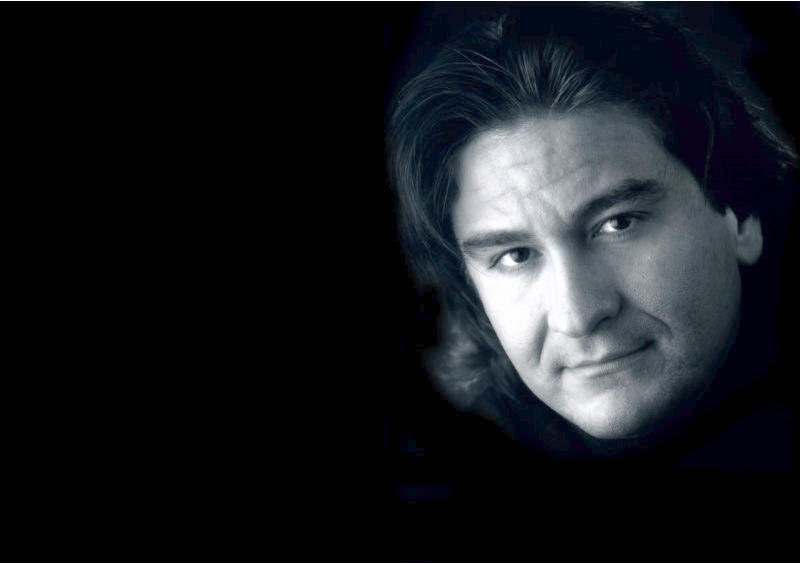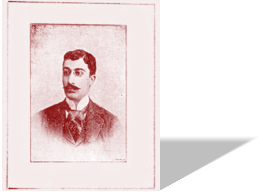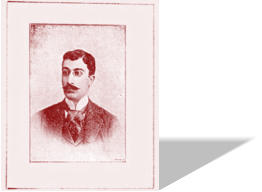

ALEXANDROS KAROZAS
When Kaváfis picks up on the everyday experience of waiting in vain for sailors ("The Prayer"), Karozas
lets the song follow folk song lines. The poet allows himself a lot of fun when describing the ridiculous
preparations for the arrival of the barbarians, and finally realizing that they are not coming: "What will
become of us without the barbarians? / Any solution was these people." The composer, who has put his
knowledge and craftsmanship into thousands of precisely given notes, lets the unusual duo improvise tuba
and guitar in between, until not a few orchestral musicians are infected by the broad grin of John Sass.
Bruno Ganz brought the lyrics closer to the non-Greek part of the Konzerthaus audience. The Greek
community in Vienna cheered Giorgos Dalaras on Sunday - rightly so - who gave another proof of his
versatility that evening. The conductor, choir, orchestra and soloists deserved the long-lasting applause, as
did the composer's standing ovation. Alexandros Karozas is also thankful that his work recalls that Greece
is better than corrupt bureaucrats and irresponsible oligarchs.
.
Gerald Jatzek
Wiener Zeitung, 2011
The better Greece
Konstantínos P. Kaváfis (1863-1933) was a man full of contradictions. He is considered a pioneer of Greek modernism and was almost never in Greece. He wrote away from the literary scene of his time, published little and was still considered a great poet during his lifetime. Alexandros Karozas has set his poems to music. This begins with the instrumentation of his extended oratorio, in which the Santouri (Asia Minor instrument) has as much space as the guitar, the tuba and the classical orchestral instrumentation with special emphasis and sonic range of the clarinet. The poet follows his street, which always leads him through the city, through the microcosm of Alexandria, where the history of three continents unites, and the composer follows him. Postmodernism here does not mean arbitrariness, but the kaleidoscopic composition of such different traditions as Shostakovich, Orthodox church music, Weill and Theodorakis, which is probably once cited."Alexandros Karozas is also thankful that his work recalls that Greece is better than corrupt
bureaucrats and irresponsible oligarchs.”













ALEXANDROS KAROZAS
When Kaváfis picks up on the everyday experience
of waiting in vain for sailors ("The Prayer"), Karozas
lets the song follow folk song lines. The poet allows
himself a lot of fun when describing the ridiculous
preparations for the arrival of the barbarians, and
finally realizing that they are not coming: "What will
become of us without the barbarians? / Any solution
was these people."
The composer, who has put his knowledge and
craftsmanship into thousands of precisely given
notes, lets the unusual duo improvise tuba and
guitar in between, until not a few orchestral
musicians are infected by the broad grin of John
Sass. Bruno Ganz brought the lyrics closer to the
non-Greek part of the Konzerthaus audience.
The Greek community in Vienna cheered Giorgos
Dalaras on Sunday - rightly so - who gave another
proof of his versatility that evening. The conductor,
choir, orchestra and soloists deserved the long-
lasting applause, as did the composer's standing
ovation. Alexandros Karozas is also thankful that
his work recalls that Greece is better than corrupt
bureaucrats and irresponsible oligarchs.
Gerald Jatzek
Wiener Zeitung, 2011
The better Greece
Konstantínos P. Kaváfis (1863-1933) was a man full of
contradictions.
He is considered a pioneer of Greek modernism and
was almost never in Greece. He wrote away from the
literary scene of his time, published little and was
still considered a great poet during his lifetime.
Alexandros Karozas has set his poems to music. This
begins with the instrumentation of his extended
oratorio, in which the Santouri (Asia Minor
instrument) has as much space as the guitar,
the tuba and the classical orchestral instrumentation
with special emphasis and sonic range of the
clarinet.
The poet follows his street, which always leads him
through the city, through the microcosm of
Alexandria, where the history of three continents
unites, and the composer follows him.
Postmodernism here does not mean arbitrariness,
but the kaleidoscopic composition of such different
traditions as Shostakovich, Orthodox church music,
Weill and Theodorakis, which is probably once cited.
"Alexandros Karozas is also thankful that his
work recalls that Greece is better than corrupt
bureaucrats and irresponsible oligarchs.”




